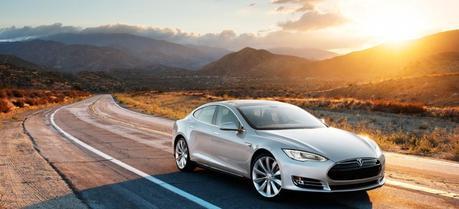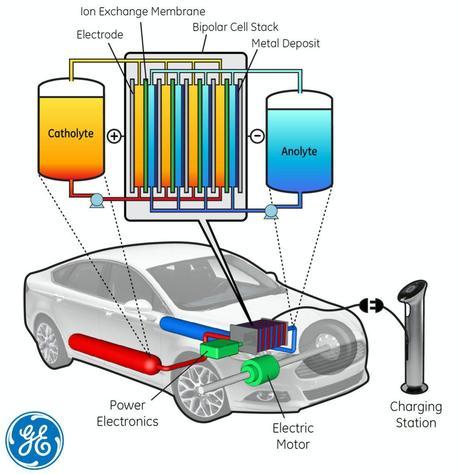 2013 Tesla Model S. (Credit: Tesla Motors)
2013 Tesla Model S. (Credit: Tesla Motors)Scientists at GE Global Research and Lawrence Berkeley National Laboratory are developing a new kind of water-based “flow” battery capable of more than just traditional, stationary energy storage. Powered by this battery, an electric family sedan would be able to, theoretically, cover the distance between New York City and Washington, D.C., on a single battery charge.
Grigorii Soloveichik, who leads the project at GRC and serves as director of the GE-led and Department of Energy-funded Energy Frontier Research Center, says that the batteries could be 75 percent cheaper than car batteries available on the market today and multiply current EV driving range. “The DOE wants a battery that can power a car for 240 miles,” he says. “We think we can exceed that goal.”

Early model of water-based flow battery design for use in electric vehicles. (Credit: General Electric)
GE engineers say that unlike lithium-ion and other battery systems, the new technology will use water-based solutions of inorganic chemicals capable supplying high energy density by ferrying more than one electron at a time. They call the system a “flow” battery because the discharge and recharge occurs in electrochemical cells that stand apart from the energy storing tanks, which makes them safer. “We envision a flow battery with applications for both transportation and large-scale energy storage,” said Soloveichik. “Put simply, for EV’s, this represents a game-changing technology.”
The research is part of the Department of Energy’s ARPA-E RANGE program that seeks to develop game-changing electrochemical energy storage technologies. Engineers from the GRC and Berkeley Lab team says that they plant to develop a working prototype and “demonstrate feasibility” of the concept over the next year.
For comparison, the 2013 Nissan Leaf has an EPA-rated range of 75 miles. Tesla Motors’ high-end 2013 Model S can reach 265 miles on a single charge. They both use lithium-ion batteries.

